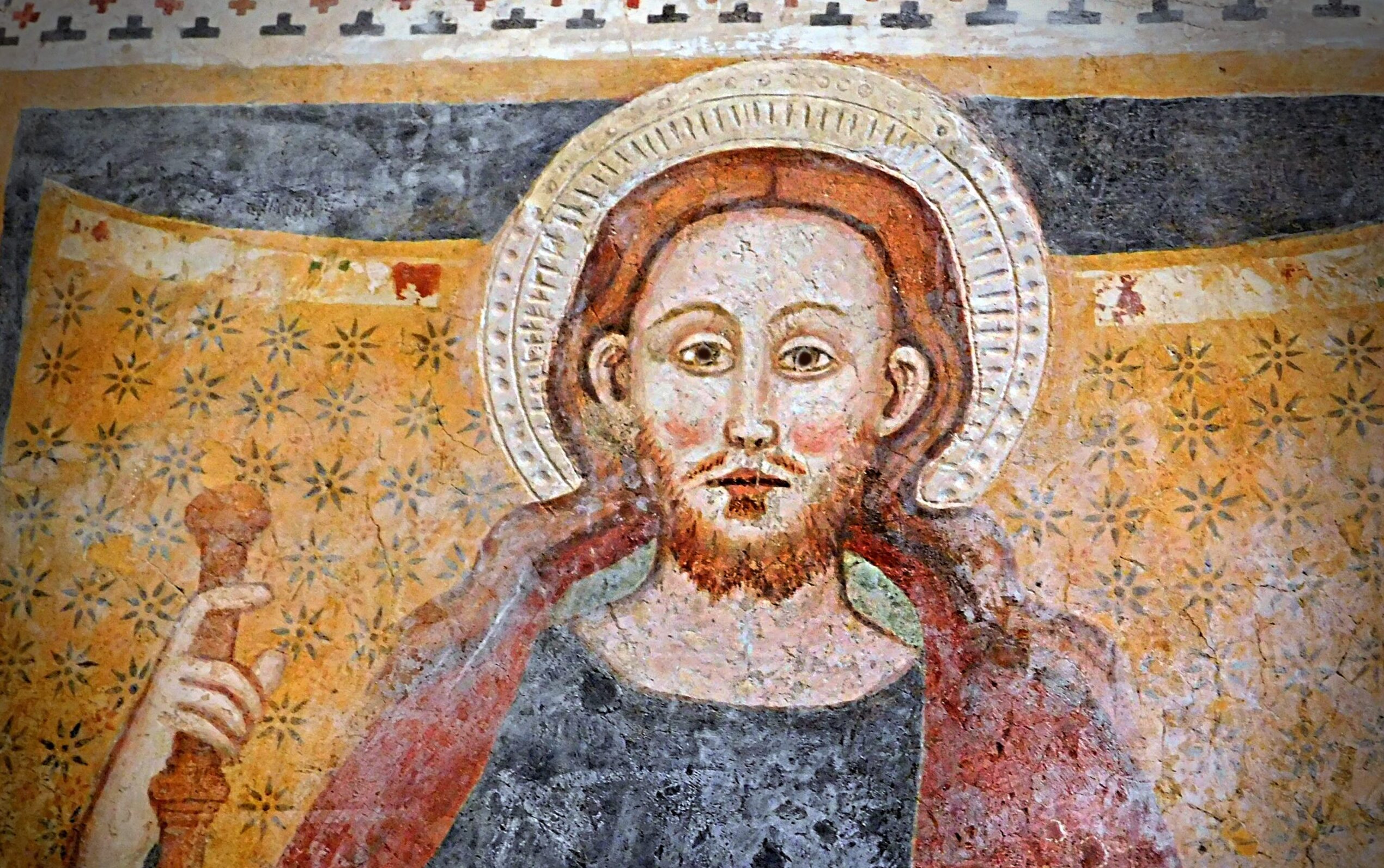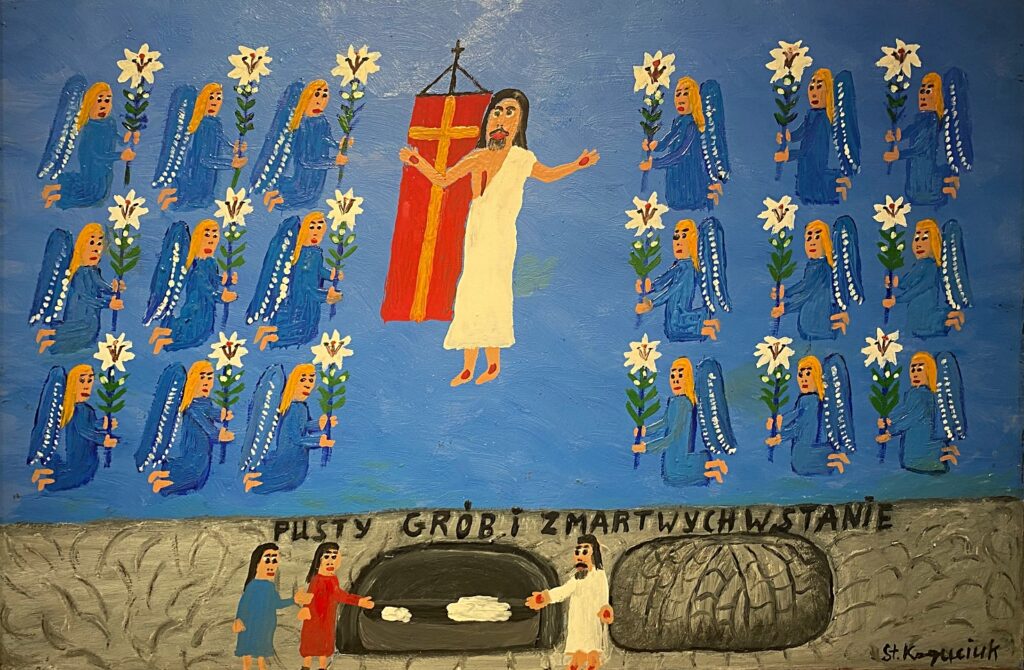#TomorrowIsSunday (EN+ES) | What did Jesus say about resurrection?


Jesus The Teacher, fresco, Asissi, PhotoCredit: Sr. Amata CSFN
32nd Sunday of Ordinary Time, Year C
Sunday, November 6, 2022
Gospel of Luke 20: 27-38
EN: https://bible.usccb.org/bible/readings/110622.cfm
You can download the commentary on the Gospel and beautiful photos:
https://www.academia.edu/90056493/What_did_Jesus_say_about_resurrection?source=swp_share
*
XXXII Domingo del Tiempo Ordinario, Año C
Domingo, 6 de noviembre de 2022
Evangelio de San Lucas 20: 27-38
ES: https://bible.usccb.org/es/bible/lecturas/110622.cfm
1. A word of introduction
The Sadducees wanted to ridicule belief in the resurrection. However, they did not expect that they might ridicule themselves. This happened when Jesus pointed out a very important argument.
2. Keywords
Some Sadducees, those who deny that there is a resurrection, came forward. Jesus said to them,
“(…) that the dead will rise even Moses made known in the passage about the bush, when he called out ‘Lord, ‘ the God of Abraham, the God of Isaac, and the God of Jacob; and he is not God of the dead, but of the living, for to him all are alive.”
In order to understand this Gospel passage, it is necessary to point out that the Sadducees and Pharisees were two factions that existed at the time of Jesus. Among their many differences was a different approach to the resurrection. The Sadducees considered only the first five books of Scripture, called the Pentateuch or Torah, as revealed by God. The Pharisees, on the other hand, considered as revealed not only the Torah, but the entire Hebrew Bible and even the oral tradition that was later written down.
The Sadducees believed that there was no mention of the resurrection in the first five books, while the Pharisees found many references to the resurrection in the Hebrew Bible, which also contains the books of the Prophets, Wisdom and Psalms, among others.
In this situation, Jesus presented the Sadducees with the argument that the resurrection is mentioned in the very Torah they recognized, specifically its second book, the book of Exodus. In doing so, he referred to God himself and Moses. For this, the Sadducees could no longer find a counter-argument. Wanting to discredit the belief in the resurrection, they discredited themselves.
The children of this age marry and remarry; but those who are deemed worthy to attain to the coming age and to the resurrection of the dead neither marry nor are given in marriage.
They can no longer die, for they are like angels; and they are the children of God because they are the ones who will rise.
Jesus shocked many and continues to shock with these words. People will not marry and get married not only because they will not be parents in eternity. The point is that life in the world to come will not be like the present. It is difficult for us to imagine them.
At the same time, Jesus points out the most important thing: that we “are deemed worthy to attain to the coming age and to the resurrection of the dead”.
3. Today
What is my faith in the Resurrection? Scripture often shows that eternal life depends on both God’s mercy and a person’s life on earth. The Bible also emphasizes that “faith of itself, if it does not have works, is dead.” What are my works? How much good is there in my life? What deeds is my faith mobilizing me to do in the coming week?

Koguciuk, Archdiocesan Museum, PhotoCredit: Sr. Amata CSFN
*
1. Una palabra de introducción
Los saduceos querían ridiculizar la creencia en la resurrección. Sin embargo, no esperaban que se ridiculizaran a sí mismos. Esto sucedió cuando Jesús señaló un argumento muy importante.
2. Palabras clave
En aquel tiempo, Jesús dijo a los saduceos, que niegan la resurrección de los muertos: “(…) Y que los muertos resucitan, el mismo Moisés lo indica en el episodio de la zarza, cuando llama al Señor, Dios de Abraham, Dios de Isaac, Dios de Jacob. Porque Diosno es Dios de muertos, sino de vivos, pues para él todos viven”.
Para entender este pasaje del Evangelio, es necesario señalar que los saduceos y los fariseos eran dos facciones que existían en la época de Jesús. Entre sus muchas diferencias estaba un enfoque diferente de la resurrección. Los saduceos consideraban sólo los cinco primeros libros de la Escritura, llamados el Pentateuco o la Torá, como revelados por Dios. Los fariseos, en cambio, consideraban como revelada no sólo la Torá, sino toda la Biblia hebrea e incluso la tradición oral que posteriormente fue escrita.
Los saduceos creían que no se mencionaba la resurrección en los cinco primeros libros, mientras que los fariseos encontraban muchas referencias a la resurrección en la Biblia hebrea, que también contiene los libros de los Profetas, la Sabiduría y los Salmos, entre otros.
En esta situación, Jesús presentó a los saduceos el argumento de que la resurrección se menciona en la propia Torá que ellos reconocen, concretamente en su segundo libro, el del Éxodo. Al hacerlo, se refirió al propio Dios y a Moisés. Para esto, los saduceos ya no pudieron encontrar un contra-argumento. Queriendo desacreditar la creencia en la resurrección, se desacreditaron a sí mismos.
En esta vida, hombres y mujeres se casan, pero en la vida futura, los que sean juzgados dignos de ella y de la resurrección de los muertos, no se casarán ni podrán ya morir, porque serán como los ángeles e hijos de Dios, pues él los habrá resucitado
Jesús sorprendió a muchos y sigue sorprendiendo con estas palabras. La gente no se casará ni se casará no sólo porque no serán padres en la eternidad. La cuestión es que la vida en el mundo venidero no será como la actual. Es difícil para nosotros imaginarlos.
Al mismo tiempo, Jesús señala lo más importante: que “somos considerados dignos de llegar a la edad venidera y a la resurrección de los muertos”.
3. Hoy
¿Cuál es mi fe en la Resurrección? La Escritura muestra a menudo que la vida eterna depende tanto de la misericordia de Dios como de la vida de una persona en la tierra. La Biblia también subraya que “la fe por sí misma, si no tiene obras, está muerta”. ¿Cuáles son mis obras? ¿Cuánto bien hay en mi vida? ¿Qué obras me moviliza mi fe para hacer en la próxima semana?
You can read also:
#TomorrowIsSunday (EN+ES) | Why does God like haste? >>>
#TomorrowIsSunday (EN+ES) | Why was the sinner justified and the Law-keeper not? >>>
#TomorrowIsSunday (EN+ES) | Prayer like a black eye >>>
#TomorrowIsSunday (EN+ES) | Why is gratefulness important in life? >>>
#TomorrowIsSunday (EN+ES) | What does a mustard seed tell us about faith? >>>
#TomorrowIsSunday (EN+ES) | How can being rich help you to be saved? >>>
#TomorrowIsSunday (EN+ES) | What did Jesus say about money? >>>
#TomorrowIsSunday (EN+ES) | What is the personalism of Jesus? >>>
#TomorrowIsSunday (EN+ES) | Is humility a weakness? >>>
#TomorrowIsSunday (EN+ES) | Who will be saved? >>>
#TomorrowIsSunday (EN+ES) | Why does Jesus bring division? >>>
#TomorrowIsSunday (EN+ES) | Does God wait on us? >>>
#TomorrowIsSunday (EN+ES) | Money is a good servant, but a bad master >>>
#TomorrowIsSunday (EN+ES) A third of the Lord’s Prayer is about forgiveness >>>
#TomorrowIsSunday (EN+ES) | Our neighbour – a stranger, someone we do not know? >>>
#TomorrowIsSunday (EN+ES) | Jesus’ manual for preachers of the Gospel >>>
#TomorrowIsSunday (EN+ES) | Why did Jesus live as if he were homeless? >>>
TomorrowIsSunday (EN+ES) | Corpus Christi. What is the miracle? >>>
#TomorrowIsSunday (EN+ES) | What does the Trinity teach us? >>>
#TomorrowIsSunday (EN+ES) | What does Jesus call the Holy Spirit? >>>
#TomorrowIsSunday (EN+ES) | How does Jesus continue to help us after the Ascension? >>>
#TomorrowIsSunday (EN+ES) | How can God dwell in us? >>>
#TomorrowIsSunday (EN+ES) | What kind of love is best? >>>
#TomorrowIsSunday (EN + ES) | How to hear Jesus? >>>
#TomorrowIsSunday (EN+ES) | What rebuilds a relationship with Jesus? >>>
#TomorrowIsSunday (EN+ES) | Why is this Sunday Compared to a “Second Baptism”? >>>
#TomorrowIsSunday (EN+ES) | Jesus’ greatest miracle >>>
#TomorrowIsSunday | What does Jesus write in the sand? >>>
#TomorrowIsSunday (EN+ES) | What is the scandal of mercy? >>>
#TomorrowIsSunday (EN+ES) | Why Does Jesus Pray? >>>
#TomorrowIsSunday (EN+ES) | What Should One Do when Tempted? >>>
#TomorrowIsSunday (EN+ES) | What Do a Hypocrite and a Mask Have in Common? >>>
#TomorrowIsSunday (EN+ES) | Why should we love our enemies? >>>
#TomorrowIsSunday (EN+ES) | Jesus’ Counsel Regarding Hatred Prompted by Faith >>>
#TomorrowIsSunday (En+ES) | In the Bible, what does it mean to be “fisher of men”? >>>
#TomorrowIsSunday (EN+ES) | Why is Nazareth a Tragic City? >>>
#TomorrowIsSunday (EN+ES) | Who is Theophilus for whom Luke wrote the Gospel? >>>



Dodaj komentarz